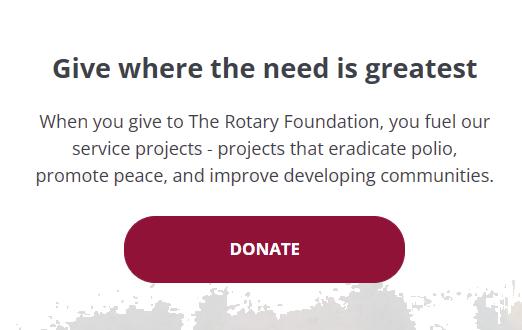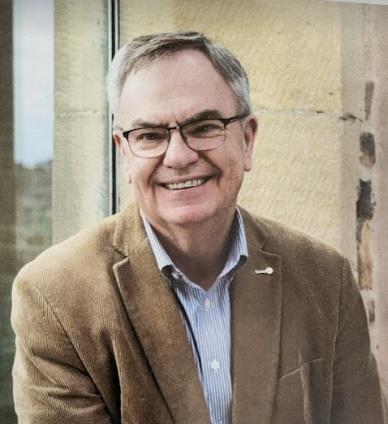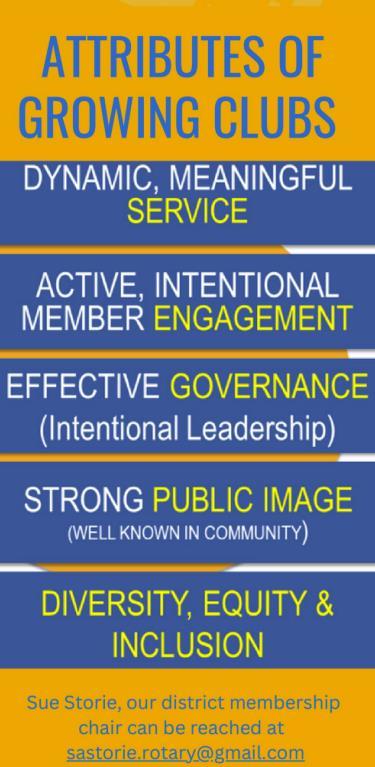
4 minute read
RI PRESIDENT -
In the spirit of caring
At the 2023 Rotary International Convention in Melbourne, I asked all Rotary members to become champions in our effort to illuminate mental health needs near and far. This includes helping one another feel more supported, advocating for mental health services, and building bridges with experts in the field to expand access to treatment.
Advertisement
It’s an important task and a big ask. But it’s also something that should feel familiar to every Rotary member – because everything we do is in the spirit of caring, giving, friendship, and compassion, and has been from the beginning of our organization.
We’ve grown into an amazing global network of 1.4 million interconnected community leaders – leaders who share a deep commitment to doing good in the world. But what makes Rotary powerful isn’t just what we do for the communities we serve We also support and empower each other, by creating a safe space for our members to bring their whole, authentic selves. We show each other comfort and care.
These connections are deeply meaningful. The U.S. surgeon general recently declared loneliness a public health epidemic. Dr. Vivek Murthy said, “We must prioritize building social connection the same way we have prioritized other critical public health issues such as tobacco, obesity, and substance use disorders.” I am proud of what Rotary has done across generations to build those kinds of social connections – and the Rotary magazine focused on loneliness and what Rotary can do about it in its January 2023 issue.
Our worldwide community and our foundational value prioritizing Service Above Self makes Rotary a powerful global advocate for mental health. A recently published study by Ohio State University found performing acts of kindness was the only one of three mental health interventions tested that helped people feel ore connected to others. Study co-author David Cregg said, “Performing acts of kindness seems to be one of the best ways to promote those connections.”
This research suggests what we’ve known all along – that doing good helps transform not just the communities we serve, but it also transforms us. As we put a great focus on mental health, let’s not think of this effort as something new to Rotary, but rather as something we can do better and as a result have a great impact on ourselves and the people we serve.
We are not starting this effort from scratch. The Rotary Action group on Mental Health Initiatives has been focused on these kinds of issues for several years, and we will be looking to members of that group for leadership as we continue to build awareness.
Mental health care fits comfortably within several of our areas of focus. As of May, there are 41 global grantsupported projects with a mental health focus. Many of them have tremendous promise, and we will e highlighting them in the months ahead.
So let’s work together to erase the stigma associated with emotional well-being, raise awareness of mental health needs, and improve access to preventive and interventional mental health services. Together, we will Create Hope in the World.
R. Gordon R. McInally President, Rotary International

Plan to donate today to The Rotary Foundation (TRF) – the engine that runs Rotary!

WHAT MAKES A SUCCESSFUL ROTARY CLUB?
A successful Rotary Club typically has several key characteristics, including the following, along with those shown at the right:

Strong Leadership: A successful Rotary Club is led by individuals who are committed, visionary, and capable of inspiring others. The club should have competent leaders who can motivate members and guide the club's activities effectively.
Active, engaged Membership: A thriving Rotary Club consists of engaged and dedicated members who actively participate in club initiatives, projects, and events. They contribute their time, skills, and resources to make a positive difference in their communities.
Diverse Membership: Diversity within the Rotary Club is crucial. A successful club includes members from various professions, age groups, backgrounds, and cultures. This diversity fosters a broader range of ideas, perspectives, and connections that enrich the club's projects and impact. (Diversity, Equity, Inclusion)
Service Orientation: Rotary Clubs are renowned for their commitment to “Service above Self ” A successful club prioritizes service projects that address local and global community needs. It actively seeks opportunities to serve, collaborate with other organizations, and make a lasting impact.
Effective Networking: Rotary provides an extensive network of professionals and community leaders. A successful club leverages these connections to build partnerships, attract resources, and expand the reach and impact of its projects. Regular networking opportunities and relationship-building activities are essential.
Continuous Learning: Successful Rotary Clubs promote a culture of continuous learning and development. They organize informative guest speakers, seminars, and training sessions to enhance members' knowledge, skills, and leadership capabilities. This focus on learning helps members grow personally and professionally.
Strong Rotary Foundation Support: Rotary International's Rotary Foundation plays a vital role in funding impactful projects. A successful Rotary Club actively supports the foundation by contributing to its programs, including fundraising efforts, and participating in grant projects that align with the club's goals.
Vibrant Club Culture: A positive and inclusive club culture is crucial for member engagement and retention. Successful Rotary Clubs create a welcoming environment where members feel valued, respected, and connected. Regular club meetings, social activities, and fellowship opportunities foster a sense of belonging and camaraderie.
Effective Communication and Strong Public Image: Open and transparent communication is essential for a successful Rotary Club. Regular communication channels, such as newsletters, social media platforms, and club websites, help disseminate information about club activities, achievements, and opportunities for involvement.
Long-Term Planning: A successful Rotary Club develops a strategic plan that outlines its goals, objectives, and desired outcomes. This plan guides the club's activities, ensuring a focus on sustainable projects and continuous growth. Regular evaluation and adjustment of the plan are necessary to adapt to changing circumstances and priorities.
It's important to note that Rotary Clubs may have unique characteristics and priorities based on their local context and member preferences. However, the aforementioned guidelines provide a solid foundation for success and impact.









